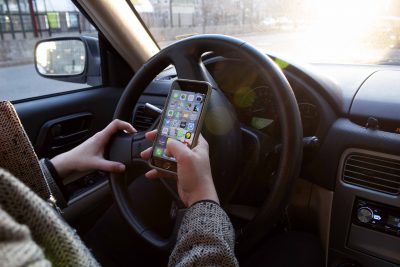
The Massachusetts Legislature will begin debating several bills that would ban drivers from operating their vehicles while holding a mobile device and require people instead to use hands-free devices to talk on their phones while driving.
The bills are set to appear in a hearing before the legislature’s Joint Committee on Transportation Thursday.
One bill to evaluate is legislation filed by Massachusetts Gov. Charlie Baker in January. Titled “An Act Relative to Improving Safety on the Roads of the Commonwealth,” the bill contains a provision that would restrict drivers’ interactions with a phone to one tap or swipe to activate hands-free mode.
Baker said in a Jan. 22 press release his proposal, which was submitted to a joint committee on Beacon Hill, would help fulfill his commitment to improving road safety in Massachusetts.
“Keeping the Commonwealth’s networks of roads as safe as possible for everyone using them is one of our administration’s top public safety priorities,” Baker said. “This bill includes common sense proposals to substantially reduce distracted driving … We look forward to working with our colleagues in the Legislature to pass this comprehensive road safety bill into law.”
The Joint Committee on Transportation will also consider a bill requiring the use of hands-free mobile devices that does not include the one-tap provision, as well as another bill merely prohibiting drivers from using cellphones in school zones.
Massachusetts Rep. Steven Howitt of Bristol, the highest-ranking Republican on the Joint Committee on Transportation, wrote in an email he supported the movement to require hands-free mode while driving, as it will keep the roads safer for everyone.
“I am always amazed while commuting to and from the State House how many people appear to be either looking down or at their phones in phone clips attached to their dashboards,” Howitt wrote. “Automobiles have become entertainment centers, which is dangerous because drivers need to stay focused on the road at all times.”
Howitt wrote the bills would build on previous legislation passed in 2010, which outlawed texting while driving and prohibited drivers under the age of 18 from using their phone in any capacity.
He added Massachusetts needs to enact restrictions on cell phone use, as distracted driving remains a “significant public safety problem” in the country.
“Distracted driving was responsible for 3,166 deaths in 2017,” Howitt wrote. “Also, this is a problem that disproportionately impacts younger drivers because cell phone use is highest among drivers between the ages of 16 and 24, with drivers under the age of 20 having the highest proportion of distraction-related fatal crashes.”
Emily Stein, president of the Medford-based organization Safe Roads Alliance, said while the hands-free bill was “not the perfect solution” — as drivers’ minds would still focus on the conversation and not on the road — it was still a step in the right direction.
“When people are talking on the phone, they’re still distracted because their mind is prioritizing the conversation over what’s in front of them,” Stein said. “However, we strongly feel that the hands-free law is what needs to happen next, so that we can get people better educated, we can get them to at least put down their phone and look at the road.”
Stein said it is important to emphasize the one-tap limit, as it would close a loophole that would allow drivers to claim they were, for instance, touching their phone screen multiple times to open a GPS rather than simply activating hands-free mode.
“If you say a one-touch activation, that closes that loophole, and they give law enforcement that really clear ability,” Stein said. “If [police] see somebody tapping away at their phone, clearly they’re not just doing an activation, they’re doing something else on their phone.”
Massachusetts lawmakers had previously proposed similar bills in earlier legislative sessions that ultimately failed to be brought up for a vote.
Christopher Hardy, 33, of Brighton, said he supported the idea of a hands-free cell phone use bill. Distracted driving is dangerous, he said, and Massachusetts needs to keep up with other New England states in passing policy on this issue.
“Obviously [requiring hands-free mode is] inconvenient but probably a good idea,” Hardy said. “Distracted driving, especially with rideshare guys doing a lot of stuff on their phones while they’re trying to drive people around, is not a great idea. Boston traffic is nuts.”
Brighton resident Joseph Geneva, 25, said while he supported the proposal, lawmakers need to consider some phones require more than one touch or swipe to activate hands-free mode.
“I feel like a lot of that might be up to how the phones themselves are designed,” Geneva said. “If you can’t do it in one touch, then the law doesn’t help much, … as little interaction with the phone is a good idea, certainly.”
Lindsey Stevens, 23, of Allston, said drivers face many distractions while on the road and that lawmakers need to focus on more than requiring drivers to use hands-free devices.
“I personally think of all the things that people are doing on the road, sometimes talking on the phone is very distracting, but sometimes it’s like the least of the distractions,” Stevens said. “So I think there is definitely other things to focus on. It’s a good idea, but I think it will be hard to enforce.”






















































































































